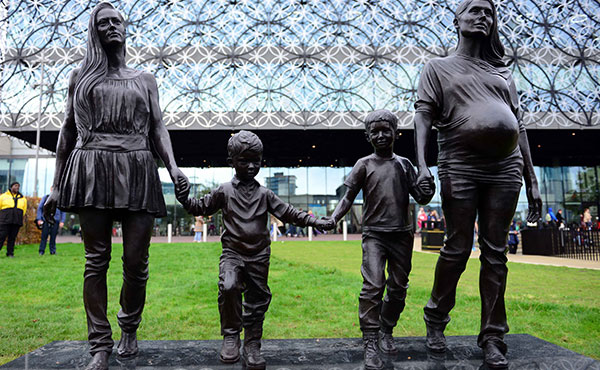A BIRMINGHAM family with mixed Indian and Irish heritage was among four shortlisted to be immortalised as a statue in the city.
The Clarkes are one of 370 families self-nominated for the A Real Birmingham Family project, led by Turner Prize-winning artist Gillian Wearing and the city’s Ikon Gallery, which has been four years in the making.
With their diverse family mix — including half-Indian mother Michelle and Irish stepfather Kevin — they hoped to be “the face of Birmingham” in the unique arts project, the product of which was revealed this month.
They also boast three daughters — Leanne, Billie and Kerry, who has a son and is expecting a second child.
In their application they spoke of their close ties, which meant they “can talk about anything”.
“I have social phobia so I need my mum and I depend on my sisters a lot,” Kerry explained. “Family means everything to me. Without my family I don’t know what I would do. They are an extension of my friends really, they help build who you are and it’s hard to get anywhere in life without them.”
Her mother Michelle added: “I was brought up not in a good home life, so to have the connection I have with my daughters feels really good. I would feel like I had let them down, never mind myself, if I didn’t have that with my children now.”

She added: “If people did see us as a statue hopefully they would say what a nice, tight family we are and see that it doesn’t matter about colour, race or whatever, we are just a family.”
But after scouring nominations from across the city for the best representation of the ‘21st Century family’, Wearing, a Birmingham-born artist herself, chose The Joneses.
Sisters Roma and Emma Jones, and their two sons Kyan and Shaye, were selected as A Real Birmingham Family by the artist and a panel of community, cultural and religious figures.
“I really likes how Roma and Emma Jones spoke of their closeness as sisters and how they supported each other,” said Wearing of the decision.
“It seemed a very strong bond, one of friendship and family, and the sculpture puts across that connectedness between them.
“A nuclear family is one reality but it is one of many and this work celebrates the idea that what constitutes a family should not be fixed.”
But the bronze statue of the family — including a pregnant Emma, which was revealed outside the Library of Birmingham earlier this month — has courted controversy since its unveiling.
Its lack of a father figure ignited a furious reaction from the Fathers for Justice campaign group, with campaigner Bobby Smith sticking pictures of himself and his daughters all over the artwork and covering part of the statue with a sheet.
“They’ve depicted the normal family with no fathers,” he said. “This is a statue that is going to be around for hundreds of years and it’s not a great thing to show young people.”
But the gallery has defended the £150,000 sculpture, which was financed through a crowd-funding campaign.
“No limits were placed on how the 21st century family might define itself, with nominations encouraged from foster families, groups of friends or even single people,” said Ikon Gallery Curator Stuart Tulloch. “The sculpture does not attempt to immortalise a ‘typical’ or ‘average’ Birmingham family, or be representative of all families in the city.”

